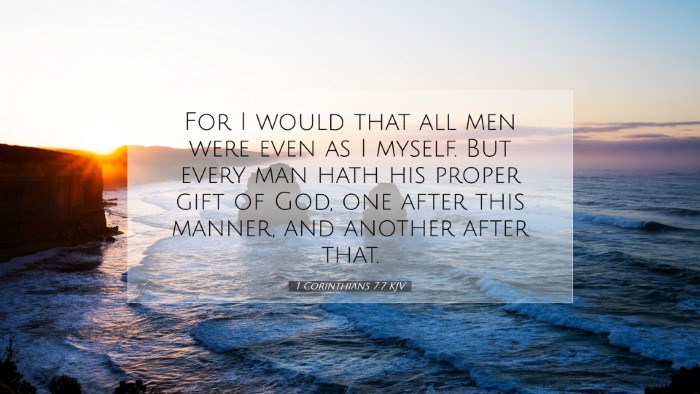Commentary on 1 Corinthians 7:7
The verse 1 Corinthians 7:7 states: "For I would that all men were even as I myself. But every man hath his proper gift of God, one after this manner, and another after that." This verse serves as a pivotal moment in Paul's broader discourse on marriage, celibacy, and spiritual gifts.
General Analysis
In this chapter, the Apostle Paul addresses the Corinthian church regarding various matters of personal conduct and marriage. In this specific verse, he expresses a desire for others to share the state of celibacy he has embraced, recognizing, however, that such a state is not feasible or desirable for everyone. His acknowledgment of different gifts underscores the diversity of God's call upon individuals' lives.
Insights from Matthew Henry
Celibacy as a Gift: Matthew Henry emphasizes that Paul's inclination toward celibacy is rooted in his dedication to serving God without the distractions that marital responsibilities can sometimes bring. Henry elucidates that Paul views unmarried life as a valuable opportunity for undivided devotion to the Lord.
Proper Gifts: Henry further comments on the notion of "proper gifts," indicating that God equips each person with unique abilities and callings. This diversity in spiritual gifts is essential to the body of Christ, as it ensures a range of functions and services that contribute to the whole.
Insights from Albert Barnes
Divine Calling: Albert Barnes reflects on the truth that each individual possesses a unique calling from God. He stresses that not everyone is called to remain single; thus, one should not feel compelled to conform to another's path. He highlights the importance of understanding one’s own divine appointment regarding marriage or celibacy.
Desire and Reality: Barnes notes that while Paul wishes for others to share in his single state, he is fully aware of the human condition and the reality that not everyone can live in this manner. He acknowledges the challenges faced by those called to marriage, providing a balanced view between the ideal and practical aspects of life.
Insights from Adam Clarke
Gift of Continence: Adam Clarke elaborates on the idea of celibacy as a gift, which he refers to as the "gift of continence." He interprets Paul's words as an invitation to consider the merits of remaining single, especially for those who are spiritually inclined and can devote themselves entirely to God. Clarke suggests that this doctrine necessitates a theological reflection on the tension between earthly relationships and spiritual pursuits.
Personal Reflection: Clarke also draws attention to the personal aspect of this gift. He acknowledges that celibacy is not merely a choice but rather a divinely bestowed capability, which can greatly vary among individuals. He stresses the importance of recognizing one's own calling and leaning into it, whether it be as a single person or married.
Theological Implications
The verse in question brings forth significant theological implications. Firstly, it reinforces the notion that God's calling is individualized. This assures believers that they are not bound to a single lifestyle or choice but are free to embrace the path God has laid out for them.
- Calling and Identity: A pivotal theme in 1 Corinthians 7:7 is the understanding of one's identity in Christ as it relates to specific life choices. Each believer's value is intrinsic to their relationship with Christ, whether they are married or single.
- Community and Service: Acknowledging different gifts also speaks to the broader community of believers. As Paul expands on the theme of gifts throughout this chapter, there is an implicit call to service and the flourishing of the church, which requires diverse contributions from all its members.
Conclusion
In summary, 1 Corinthians 7:7 encapsulates Paul's vision for a church that embraces the varied callings and gifts of its members. The insights drawn from the public domain commentaries of Matthew Henry, Albert Barnes, and Adam Clarke collectively inform a holistic understanding of this verse. The sentiment that celibacy is a gift, though desirable, is tempered by the recognition of the differing paths that God has for each person.
For pastors, students, and theologians, this passage encourages deep reflection on divine calling, personal identity, and communal responsibility within the body of Christ. The beauty of Christian living lies in its diversity—both in gifts and in vocational paths—as each believer seeks to honor God through their unique walk of faith.


